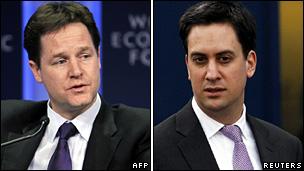Clegg and Miliband's battle over politics of hope
- Published

The two party leaders are trying to present themselves as being on the sunny side of politics
All politicians want to point towards the sunlight.
To give voters a sense of hope and aspiration; of better times.
Ronald Reagan famously held out the promise of a brighter future when he won the 1984 presidential campaign by telling voters: "It's morning again in America."
In Britain it is a message which has politically become ever more important, given bleak economic times when people are having to brace themselves for job losses and spending cuts.
Hence the concerted attempt by both Nick Clegg and Ed Miliband to present themselves as on the sunny side of politics and to cast their opponents as dragging Britain down a much darker road.
'British Promise'
Nick Clegg holds out the hope of a more prosperous and fair economy and society, where jobs and prosperity are shared throughout the country and not just concentrated in the City and the south east.
Ed Miliband talks of the "British Promise" and ensuring our children are not doomed to a life of worklessness, poor prospects and limited career opportunities.
Both men tap into that most basic instinct of all parents - namely the hope that their children will be able to succeed and do better than them.
But here's the rub. Talking about the sunlit uplands is one thing, having a realistic plan to get there is another.
The problem both Mr Clegg and Mr Miliband face is that re-balancing the British economy and creating job-rich prospects for the young are long-term projects which may even be beyond the powers of any government.
The decline in British manufacturing, the steady haemorrhage of private sector employers from the north, the tilt of economic power towards Asia are not short-term problems which can be solved with the flick of a switch.
'Long road'
Similarly re-creating masses of decently paid jobs for our young people when we are an ageing society and older workers are desperately clinging on to their posts to pay for diminishing pensions is a massive challenge.
Never mind the intense competition from able and ambitious youngsters from poorer parts of the world.
These are huge, inter-generational problems we, and probably all western societies, are having to face.
Mr Clegg acknowledges this - saying it will be "a long, hard road".
But the risk for both Mr Clegg and Mr Miliband is that they raise false hopes; that their talk of a better future is seen as just that - talk.
While voters may value optimism, they surely also value realism. Headlines and rhetoric are the easy part.
For the politics of optimism to gain traction it has to be coupled with a credible thought-through strategy and policies that give parents a genuine belief their children can expect a better future.
And here both Mr Clegg and Mr Miliband still have much work to do. In short hope, one suspects, will need to be built on firmer foundations.
- Published4 February 2011
- Published13 December 2010
- Published25 August 2010
- Published23 June 2010